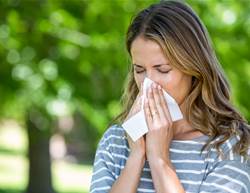If you developed a dry cough a few years ago, you may have simply written it off as having a cold. But these days, it’s understandable to be on high alert for a slew of possible illnesses. Do you have a dry cough from COVID? The flu? RSV? Something else entirely? Either way, it makes sense to be a little wary if you happen to develop a dry cough.
But what does it mean if you happen to develop a dry cough and, while we’re at it, what is a dry cough, anyway? Here’s the deal.
What is a dry cough, exactly?
There’s actually no specific medical criteria to classify a dry cough and a wet cough, explains GP Dr David Cutler. That’s because it’s open to interpretation. “Your wet cough might seem like a dry cough to me,” he says.
But, in general, a dry cough means you’re coughing but nothing is coming up, like phlegm or mucus, says allergist Dr Purvi Parikh. If you’re regularly producing phlegm when you cough, you’re likely dealing with a wet cough.
What does a dry cough feel like?
In general, it can feel like any cough without the phlegm. You can also feel like you’re having dryness, a tickle, or tightness in your chest, Dr Parikh says.
Ultimately, it feels a lot like your lungs are irritated, says nurse and hospital manager Aline M. Holmes. “It may feel like a sense of needing to clear your throat or could be deeper in terms of large airways irritated as well,” says infectious disease expert Dr Thomas Russo.
What causes a dry cough?
It’s easy to think that you have COVID-19 when you develop a dry cough (and it’s entirely possible you do). But experts say there are actually a lot of different things that can cause a dry cough. Those include:
- Allergies
- Being indoors in dry air
- Postnasal drip
- Gastroesophageal reflux (GERD)
- Asthma
- Smoking
- COVID-19
- Flu
- RSV
“A dry cough is most commonly seen in viral infections,” says Dr Russo. Bacterial infections, like bronchitis and pneumonia, however, are more likely to cause a wet cough, he says.
When should you be worried about a dry cough as a sign of COVID-19?
❗If you have trouble breathing, persistent chest pain or pressure, new confusion, blue lips or cannot stay awake, seek medical attention ASAP.
If you develop a dry cough, it’s very possible that you could simply be dealing with allergies, being inside all day or other environmental factors.
But it may also be pointing to COVID-19, the flu or RSV, so it’s important to pay attention to signs of those viruses, too. According to the Centers for Disease Control and Prevention (CDC), symptoms of COVID-19 can include but are not limited to:
- Fever or chills
- Cough
- Shortness of breath or difficulty breathing
- Fatigue
- Muscle or body aches
- Headache
- New loss of taste or smell
- Sore throat
- Congestion or runny nose
- Nausea or vomiting
- Diarrhoea
You don’t necessarily need to have a dry cough in order to have COVID-19. “It’s usually a dry cough, but a productive one can also occur,” says infectious disease expert Dr Richard Watkins.
Symptoms of the flu include, reports the CDC:
- fever or feeling feverish/chills
- cough
- sore throat
- runny or stuffy nose
- muscle or body aches
- headaches
- fatigue
Symptoms of RSV include, according to the CDC:
- Runny nose
- Decrease in appetite
- Coughing
- Sneezing
- Fever
- Wheezing
What to do if you develop a dry cough
If you develop a dry cough, it’s a good idea to test yourself for COVID-19 with a home test, says infectious disease specialist Dr William Schaffner. “It could be COVID, it could be flu, it might be RSV, or it could be something else,” he says. But starting with a home COVID test is often the easiest place to start, Dr Schaffner points out. If that’s negative and you have symptoms of the flu, he recommends that you contact your doctor about getting tested.
It’s important to find out what’s behind your cough to both help protect others and to find the right treatment, Dr Russo says.
How to treat a dry cough
If you have a dry cough and it’s not bothering you, Dr Russo says you don’t necessarily need to do anything for it. But, if you’re uncomfortable or it’s keeping you up at night, Dr Adalja suggests taking a cough syrup that contains the cough suppressant dextromethorphan. You can also try cough drops to soothe your throat and help suppress the reflex that makes you want to cough. Hot water with lemon and honey may also help.
You can also try taking a steamy shower, which is “always very helpful” for lung irritation, Dr Schaffner says. “That can bring moisture to those mucus membranes and offer some relief,” he says, noting that it’s also important to drink lots of water.
When to call your doctor for a dry cough
Before you seek medical attention for your dry cough, Dr Russo recommends keeping an eye on your cough to make sure it’s not getting worse. “If you feel your cough is deep down in your lungs, it’s good to monitor your oxygen levels through a home pulse oximeter,” he says.
Call your doctor about next steps if your oxygen levels dip below 94%, provided they’ve been consistently higher in the past, says Dr Russo. “The trend is important,” he says. “If your baseline is higher and dropping [call your doctor],” he says. If your baseline is lower and stable, continue to monitor your symptoms. The big concern, Dr Russo says, is the possibility of COVID pneumonia.
In general, any cough that’s linked with a fever over 38°C should be concerning, Dr Parikh says. Ditto if you happen to develop a cough without a fever and you’re not sure what’s causing it, says Dr Russo.
In addition, if you exhibit any of the following symptoms, call your doctor right away:
- You’re coughing up blood or blood-tinged phlegm.
- You have chest pain.
- You have shortness of breath.
And, of course, if you’re unsure if you need help, it doesn’t hurt to at least check in with your doctor’s office to be sure everything is okay.










